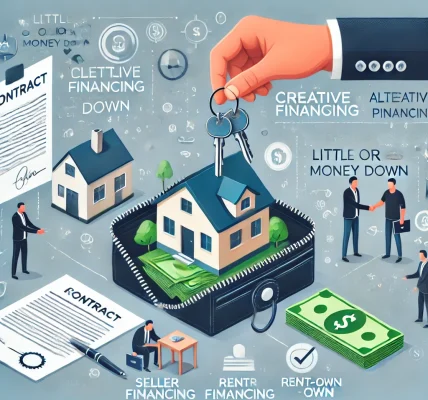Investing in real estate has long been considered one of the most reliable ways to build wealth. Property values tend to appreciate over time, and real estate can offer passive income through rent and leasing. However, like all investments, real estate comes with its own set of risks—many of which are not immediately apparent. While the rewards can be substantial, it’s essential to be aware of these hidden risks to avoid costly mistakes and protect your financial future.
This guide will walk you through the most common and often overlooked risks associated with real estate investments and provide you with actionable steps to mitigate those risks. By the end, you’ll understand how to make informed decisions, safeguarding yourself from legal complications and financial setbacks.
1. Market Fluctuations and Economic Downturns
Risk: One of the most unpredictable risks in real estate investment is the fluctuation of the property market. The market can be significantly affected by economic downturns, political instability, changes in interest rates, and shifts in consumer behavior.
How to Avoid It:
- Research Market Trends: Regularly monitor the local and national real estate market trends. Look for areas with a history of consistent growth, but also be mindful of the factors that could lead to market volatility.
- Diversify Your Portfolio: Spread your investments across different property types (residential, commercial, industrial) and different geographical locations. This will reduce the impact of a downturn in any one area.
- Avoid Overleveraging: Don’t rely heavily on borrowed money (i.e., mortgages) to finance your investments. In case of a market dip, you’ll be better able to weather the storm without falling into debt.
2. Property Condition and Hidden Maintenance Costs
Risk: Even after conducting an initial property inspection, hidden maintenance issues may arise over time. Structural problems, plumbing issues, or faulty electrical systems can result in significant unplanned costs that eat into your profits.
How to Avoid It:
- Get a Thorough Inspection: Always hire a qualified inspector to evaluate the property thoroughly. Look beyond the surface to ensure that all systems (electrical, plumbing, roofing, etc.) are in good condition.
- Factor in Repair Costs: Before purchasing any property, estimate the potential repair and maintenance costs. Make sure these costs are accounted for in your investment calculations.
- Regular Maintenance: Once you own the property, schedule regular maintenance to address minor issues before they turn into costly repairs.
3. Legal Issues and Zoning Laws
Risk: Each location has its own set of zoning laws, building codes, and regulations. Violating these laws can result in fines, the inability to rent or sell your property, and even legal action. Additionally, if the property is subject to certain legal disputes (e.g., pending title disputes), your investment could be in jeopardy.
How to Avoid It:
- Understand Zoning Regulations: Familiarize yourself with the zoning laws in your area of investment. Know whether the property is zoned for the use you intend (residential, commercial, etc.).
- Title Search: Always conduct a title search to ensure the property is free of legal disputes and that the seller has clear ownership. This can prevent future legal battles.
- Consult an Attorney: Work with a real estate lawyer to ensure your investment is legally sound. They can help you navigate complex regulations and avoid any legal pitfalls.
4. Liquidity Risks
Risk: Real estate is often considered an illiquid asset. Unlike stocks or bonds that can be sold quickly, real estate takes time to sell or lease, and during periods of economic uncertainty, it may take even longer to find buyers or tenants. This liquidity risk can be especially dangerous if you need quick access to cash.
How to Avoid It:
- Plan for Emergencies: Always have a cash reserve to cover expenses in case you are unable to sell or lease the property promptly. This is particularly important if you depend on rental income for your living expenses.
- Evaluate Property Types for Liquidity: Some properties, like commercial spaces, may take longer to sell or rent compared to residential properties. Evaluate the liquidity of the property type before making an investment.
5. Tenant Risks and Vacancy Loss
Risk: If you’re investing in rental properties, tenant-related issues can pose a significant risk. Non-paying tenants, frequent turnover, or damage to the property can lead to financial losses. Furthermore, long periods of vacancy can mean that you’re losing income without gaining any returns.
How to Avoid It:
- Screen Tenants Thoroughly: Always conduct a comprehensive background check on potential tenants. This should include credit checks, rental history, and criminal background checks to ensure you’re renting to reliable individuals.
- Lease Agreement Protection: Draft a clear and enforceable lease agreement that outlines all terms, responsibilities, and consequences of non-compliance. This can protect you if disputes arise.
- Have a Vacancy Plan: To minimize the risk of vacancy, ensure your property is in a desirable location with high demand. Additionally, consider hiring a property management company to help find and screen tenants, and manage the property.
6. Interest Rate Increases
Risk: Real estate investments often involve financing, and if you have a variable-rate mortgage, increases in interest rates can lead to higher monthly payments. If rates rise significantly, it could strain your budget, making it more difficult to meet financial obligations.
How to Avoid It:
- Lock in a Fixed Rate: If possible, opt for a fixed-rate mortgage. This ensures that your interest rate remains the same throughout the life of the loan, protecting you from fluctuations in market rates.
- Monitor Rate Trends: Stay informed about potential interest rate hikes. Central banks around the world (e.g., the Federal Reserve in the U.S.) often signal rate changes in advance, so staying up to date on monetary policy can give you a heads-up.
7. Environmental and Natural Disaster Risks
Risk: Certain areas are more prone to natural disasters such as floods, earthquakes, or hurricanes. If your property is located in a high-risk zone, it could lead to significant financial loss if the property is damaged or destroyed. Even if the property is not directly affected, you may face higher insurance premiums or decreased property value.
How to Avoid It:
- Evaluate the Location’s Risk: Before investing in any property, research the area’s vulnerability to natural disasters. This includes flood zones, earthquake-prone areas, or regions with extreme weather patterns.
- Invest in Proper Insurance: Purchase comprehensive insurance coverage, including flood insurance or earthquake coverage if necessary. Ensure your policy covers the full replacement cost of the property.
- Risk Mitigation Strategies: If you own property in a disaster-prone area, take steps to mitigate risks, such as reinforcing buildings, elevating structures, or installing disaster-proof features.
8. Scams and Fraud Risks
Risk: Real estate scams are unfortunately common, with fraudsters attempting to deceive investors with fake listings, title fraud, or misrepresentation of property value. Being caught in a scam can result in substantial financial losses and legal complications.
How to Avoid It:
- Work with Trusted Professionals: Always work with licensed real estate agents, appraisers, and attorneys. Make sure they have a good reputation and have been in the business for a while.
- Verify Listings and Titles: Cross-check property listings with multiple sources and verify title ownership to avoid scams. Never rush into a deal without confirming the legitimacy of the transaction.
Conclusion
Real estate investment can be a powerful way to build wealth, but it is not without its risks. From market fluctuations to tenant-related issues, environmental hazards to legal disputes, the potential pitfalls are numerous. However, with careful research, proper due diligence, and a clear strategy, many of these risks can be mitigated.
The key is to remain proactive. Always thoroughly vet properties, monitor your investments regularly, and work with experienced professionals to guide you through complex legal and financial matters. By doing so, you can increase your chances of success in real estate and avoid the common traps that many first-time investors fall into.
Remember, real estate is a long-term investment. With patience and the right strategy, you can protect your assets, maximize returns, and build a stable, profitable real estate portfolio. Stay informed, be cautious, and always be prepared for the unexpected.




